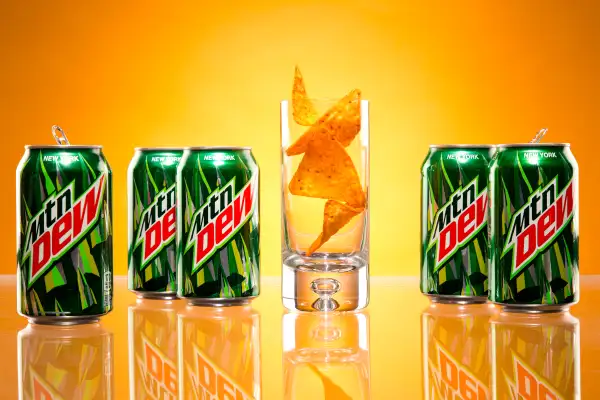Top 10 Strangest Things Marketers Tried to Sell Us in 2014

- Forget That Dos Equis Guy, This Millionaire Was the Most Interesting Man in the World
- Your Old iPod Could Be Worth $20,000
- 12 Things Made for Kids That Are Now Being Marketed to Adults
- How Much Is an Olympic Medal Worth? Record Gold and Silver Prices Are Driving Up Their Value
- Average Car Insurance Prices Expected to Hit $2,500 This Year

Check out 10 of the strangest things marketers tried to talk us into buying in 2014. A few of them, we're sure you'll agree, were quite literally hard to stomach.
Dewitos
Following on the heels of Doritos cheese sticks and Doritos tacos, this fall PepsiCo began doing taste tests of the most frightening Doritos mashup so far: Doritos-flavored Mountain Dew, a.k.a. "Dewitos" or "Dewritos." The innovation has been called a "new frontier for fast food," with a flavor best described as "liquid cheese," only with lots of caffeine.
Quarters for Doing Laundry
Over the summer, a startup launched on the premise that people would pay a premium for a subscription service for quarters, which would be delivered so that you wouldn't have to go round up up the on your way to the laundromat. The service charged $15 per month for a once-a-month delivery of a $10 roll of quarters. Needless to say, the site folded nicely and neatly—not unlike properly handled laundry—after about one week of existence.
Burgers for Breakfast
The battle for fast-food breakfast customers raged in 2014, with Taco Bell and McDonald's launching ads, special promotions (like free coffee), and new products to beat out the competition. Burger King joined in the fracas with the laziest fast-food concept in recent memory: Burgers for Breakfast, in which BK made Whoppers and other burgers available during early morning hours. The idea reportedly flopped with customers; burgers were not on the restaurant's national breakfast menu at last check.
A Fake “Mona Lisa”
No, no one actually tried to sell the original Mona Lisa by Leonardo da Vinci. But to celebrate the launch of a new documentary about Mark Landis, an infamous and prolific art forger, Landis's forged version of the Mona Lisa was hung in a coffee shop in New York City with an asking price of $25,000. Apparently, no one wants to pay that much for a fake—not even a masterful fake by the likes of Landis. "After all the hype, there wasn't much real interest or a sale," a spokesperson for the coffee shop told us.
Derek Jeter's Used Socks
Throughout the course of Derek Jeter's final season for the New York Yankees, ticket prices soared when #2 was in town, and an astonishing and varied amount of Jeter collectibles were marketed and sold. Among the oddest pitches: $400+ for one of Derek Jeter's socks (game used, of course).
Seven Weeks of Unlimited Pasta
In September, the Olive Garden restaurant chain rolled out one seriously odd food offer: The Neverending Pasta Pass. The potentially cost-effective (also: potentially nauseating and potentially weight-altering) $100 passes gave users as many pasta dishes, breadsticks, and Coca-Cola soft drinks as they could stomach over the course of seven weeks. Only 1,000 of the passes were offered, and they were quickly snatched up by the masses—a few of whom recorded the good, bad, and ugly of eating at Olive Garden week after week.
Ebola Fashion
The Ebola outbreak stoked fears around the globe, while also serving as a boost for an array of products, some understandable (hand sanitizer, disinfectant wipes, anti-germ protective gear), others downright bizarre (Halloween costumes, fashionable masks that retailed for $20). Yet another entrepreneur was trying to sell Ebola.com for at least $150,000 this year; he'd purchased the web domain in 2008 and has been waiting for an opportune moment to sell.
Pot Edibles That Look Like Hershey's Candy
Soon after the sale of recreational marijuana was legalized in Colorado, shops began selling a range of smokeable and ingestible products. Among the edibles was a brand of marijuana-infused candy called TinctureBelle, which made pot treats like Ganja Joy and Hasheath—with labels that looked eerily similar to traditional Hershey's candies Almond Joy and Heath. Understandably, family values advocates and Hershey's didn't like the imitation versions, and the candy company sued last summer. The case was settled in October, and the pot candies that resembled Hershey bars have been recalled and destroyed.
Caffeinated Underwear
File this one under the category of products making outlandish claims that are just too good to be true: In 2014, the FTC ruled that a pair of companies that made and marketed caffeine-infused underwear must stop advertising that its products aided in weight loss. There was no scientific evidence to back up the claims, and customers who were coaxed into buying the caffeinated skivvies were granted refunds.
Bigger Butts
In 2014, marketers were more than happy to help convince women that they should try to enhance their physical assets to resemble Kim Kardashian and Jennifer Lopez in one particular way. Hence the increase in butt implants and lift surgeries, as well as the sharp sales rise of products such as padded underwear, which give the appearance of a larger backside.